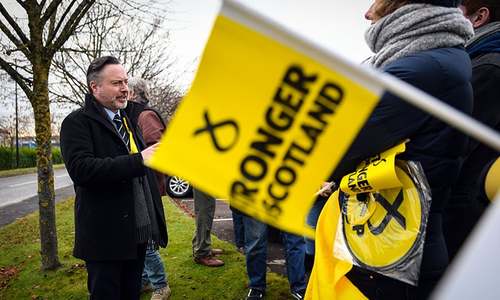LONDON: Around 46 million voters will head to polling booths across the United Kingdom on Thursday (today) during an election which polls predict will result in a Conservative majority after a tight race.
Voters’ key concerns include Brexit, a slow economy, feeble health and social care provision, the climate crisis, and law and order. A fresh poll released by data company YouGov a day before voting named the Conservative party as favourite but also said a hung parliament was a real possibility.
Anyone aged 18 or more can vote, as long as they are registered and a British citizen or a qualifying citizen of the Commonwealth or Republic of Ireland. These voters will choose 650 men and women as Members of Parliament (MPs), with 326 seats needed for a majority.
The election has been billed by both major parties — the Conservatives and Labour — as the “most important in a generation” as the two sides have radically different plans for Brexit and spending on public services. The ballot is expected to decide how and if the UK will finally quit the European Union nearly three-and-a-half years after the Brexit referendum.
Election sees historic number of Pakistani-British candidates
Labour party leader Jeremy Corbyn has urged people to vote for “a Labour government that will be on your side; a Labour government that will save our NHS [National Health Service]”.
“It’s time for a pay rise for 12m people, for lower fares and bills, and for free childcare,” Mr Corbyn said in a speech on Wednesday. “It’s time for pension justice for women born in the 1950s, and for free personal care for pensioners. And it’s time for everyone to have free education and decent jobs.
“We will put money in your pocket because you deserve it. The richest and big business will pay for it. We will save our NHS by giving it the money it needs, ending privatisation and by not selling it out to [President Donald] Trump.”
Prime Minister and Conservative leader Boris Johnson said: “This is a very close-fought election, and we need every vote. The only mathematical alternative to a working majority for a Conservative government is the real, real risk of another hung parliament. That’s another five years of confusion, chaos, dither and delay. We cannot go down that route.”
Candidates of Pakistani descent
This election, meanwhile, has witnessed a significant surge in British Pakistani candidates as compared to the polls in 2017. While the previous election saw 40 Pakistani-origin candidates, the latest vote has seen at least 70 such candidates who were given tickets by the Conservative, Labour and Liberal Democrat parties. Some British Pakistani candidates will also be running as independents.
The breakdown of the candidates is as follows: 20 for Conservative, 19 for Labour, 12 for Lib Dems (they have never had a Pakistani-origin MP), five for Brexit Party, four for Green Party and 10 independents.
According to Runnymede, a race equality think tank, British Pakistanis usually follow the pattern for minorities and vote for the Labour party. “This was as high as 80 to 90 per cent in the 1990s,” the think tank’s executive director Dr Omar Khan told Dawn.
“In 2010, Pakistani and Indian British voters were a bit less likely to vote Labour (at around 60pc) compared to Bangladeshi, Caribbean and African voters, but still far more likely to vote Labour than white British voters. By 2017, however, Pakistanis had increased their vote share to around 90pc for the Labour party. In the 2010 election the main reasons were unemployment and the economy, again as with all ethnic minority voters. It’s worth noting that 54pc of Pakistani children are living in poverty, so it’s not surprising that economic issues are at the forefront.”
When asked if candidates do consider minority voters during their campaigns, Dr Khan said: “I do think they consider Pakistani voters somewhat. However, there are only a few constituencies where Pakistani voters are more than 18pc of the vote. This means that candidates need to appeal to all voters to win.”
Sunder Katwala, director of British Future, a non-partisan think tank that researches issues of identity and integration, also said that the British Pakistani vote had traditionally been for labour, but added that it was not universally so.
He added that the Conservative party appeared to go backwards with British Pakistani voters from a low base in 2017. “Several factors — age, social class, race inequalities, and the Conservative party’s record on tackling Islamophobia — on which an inquiry has been pledged, but not yet begun — and Boris Johnson’s own comments on Islam as a journalist and politician are among the barriers to the party making progress. Former party chair Sayeeda Warsi, the first British Pakistani cabinet minister under David Cameron, has argued that her party has been in denial over taking anti-Muslim prejudice seriously in the party.”
Given its historically weak performance, the Conservative party is keen to demonstrate that it can increase its appeal among all groups, with Boris Johnson appointing the most ethnically diverse cabinet in British political history, including Chancellor Sajid Javid who has a British Pakistani background.
Katwala said that newly elected MPs are likely to include Saqib Bhatti, the youngest ever chair of the Greater Birmingham Chambers of Commerce, whose parents came to Britain from Pakistan in the 1960s, and who defeated a former prime minister’s chief of staff, Nick Timothy, in being selected for the safe Conservative seat of Meridien.
“This new generation of Conservatives has more work to do to persuade British Pakistani voters of the party’s commitment to tackling ethnic disadvantage as part of equal opportunity.”
Published in Dawn, December 12th, 2019

















































